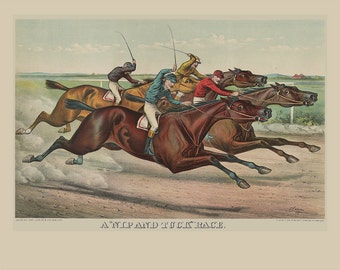 You must keep on your toes if you don't want to be caught flat-footed! In this case flat-footed does not refer to fallen arches but rather to the condition of a race horse's feet. If all four are on the ground (standing instead of prancing) when the gate rises, the horse will get a slower start. If you are caught flat-footed you may be forced to cool your heels while waiting for another opportunity. In the seventeenth century "to cool your heels" replaced an earlier phrase, "to cool your hoofs", a reference to a horse that takes advantage of a break by lying down. "To kick up your heels" on the other hand, refers to a horse frisking about in the pasture after a hard day's work.
You must keep on your toes if you don't want to be caught flat-footed! In this case flat-footed does not refer to fallen arches but rather to the condition of a race horse's feet. If all four are on the ground (standing instead of prancing) when the gate rises, the horse will get a slower start. If you are caught flat-footed you may be forced to cool your heels while waiting for another opportunity. In the seventeenth century "to cool your heels" replaced an earlier phrase, "to cool your hoofs", a reference to a horse that takes advantage of a break by lying down. "To kick up your heels" on the other hand, refers to a horse frisking about in the pasture after a hard day's work.An inexperienced person is known as a tenderfoot which once again originally referred to horses. In the seventeenth century an unworked horse was called tenderfooted. The first application to a person was around 1850 and was popularized by miners in the California gold rush.
While on the subject of horses a herd of horses can also be called a drove, and a group of horses racing is called a field of horses. A group of young colts are sometimes called a race, rag or rake of colts. A herd of mules can be called a burden or barren. Donkeys (or asses) also come in droves.
Neatsfoot oil used to be applied to shoes, so a guess at its origin might be that it is an oil to keep one's shoes or feet neat. Not so. Neat formerly meant oxen. The lower legs including the foot bones but not the hooves of oxen and cattle are still used to make neatsfoot oil. An interesting discussion of making a similar product from elk bones can be found at https://www.tapatalk.com/groups/paleoplanet69529/self-made-deer-foot-oil-t22162.html.
Although not as well represented in slang as the feet of livestock, cats' feet deserve some mention. To pussyfoot around a subject means to carefully avoid answering it directly. I've never seen my cats mincing around anything except maybe once when one flushed out a combative mouse, but presumably the fastidious nature of cats led to this expression. To be made a cat's paw means to be used for the advantage of another. According to a story from the 1500's Pope Julius II owned a monkey and several cats. One day the monkey was observed trying to get a chestnut out of the fire. After burning his fingers he grabbed a nearby cat, hauled it over to the fire and used its leg to rake the nut out of the fire. I find this an implausible story since any cat I know would protest violently such ill usage. If the monkey were small like a Capuchin the cat could easily overpower it. If it were an ape, say a baboon, the cat would surely scratch it badly since declawing was not in vogue at the time. A chestnut is hardly worth bloodshed. But slang doesn't depend upon veracity for usage, just repetition.
My foot itches. Does that mean it's time for a trip? I hope so!
I just saw a funny joke: why are cow's feet called hooves instead of feet? Because they lactose!
ReplyDelete